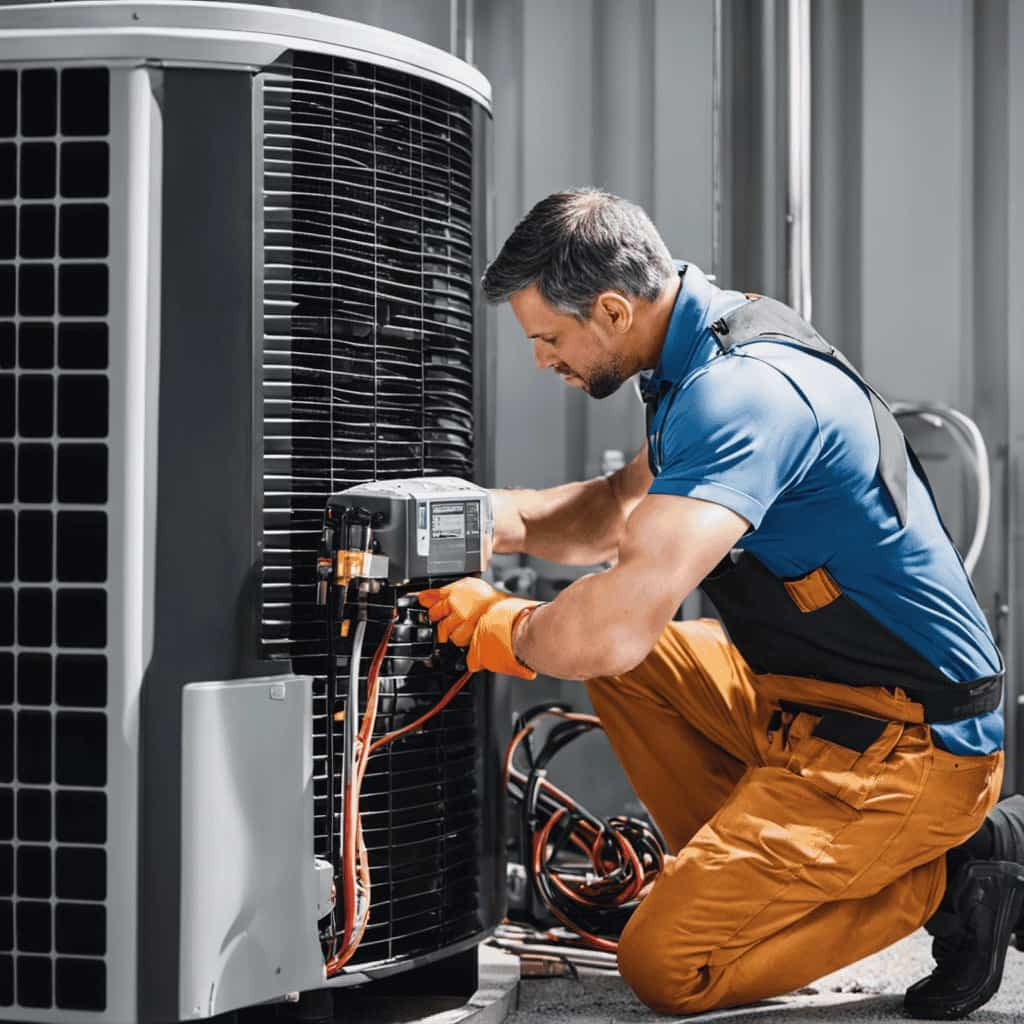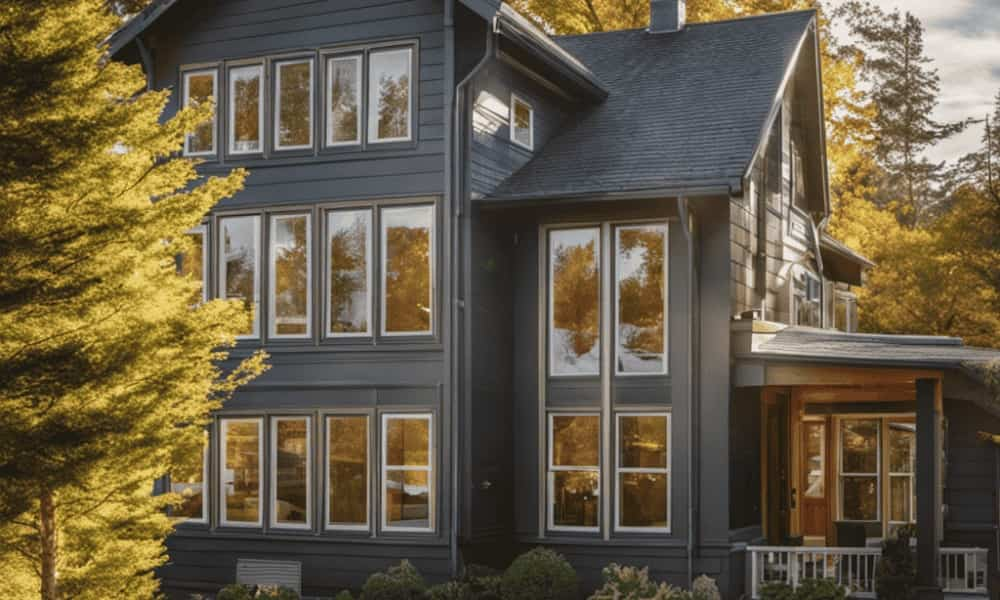Searching for ways to reduce your electricity bill? Search no more! This article reveals five effective strategies to decrease energy use by utilizing efficient heat pumps.
From understanding heat pump efficiency ratings to optimizing settings for reduced power usage, we’ve got you covered.
By implementing these techniques, you can enjoy the benefits of energy conservation while serving your wallet and the environment.
So let’s dive in and discover how efficient heat pumps can help you save!

Key Takeaways
- Energy efficiency plays a crucial role in heat pumps.
- Proper sizing and installation are essential for efficiency.
- Choosing the right size heat pump is crucial for maximizing energy savings.
- Proper maintenance and regular inspections are important for optimal performance and energy savings.
The Importance of Energy Efficiency in Heat Pumps
We believe that energy efficiency plays a crucial role in heat pumps. Energy saving techniques and optimizing heat pump settings are essential in reducing power consumption and promoting sustainability.
By implementing effective energy saving techniques, heat pumps can operate more efficiently, resulting in lower energy costs and reduced environmental impact. One such technique is optimizing the heat pump settings to ensure that it operates at its peak performance.
This includes properly sizing the heat pump for the space it’s intended to cool or heat, adjusting the thermostat settings for optimal comfort and efficiency, and regularly maintaining and cleaning the equipment. Additionally, using advanced technologies such as variable speed compressors and smart controls can further enhance energy efficiency and overall performance.
Through these measures, heat pumps can significantly contribute to energy conservation and provide efficient heating and cooling solutions for a wide range of applications.

Understanding the Role of Heat Pump Efficiency Ratings
When considering heat pump efficiency, it’s important to understand the role of efficiency ratings in determining the overall performance and energy savings potential of the system. Here are five key points to help you better understand the importance of heat pump efficiency ratings:
-
SEER Rating: The Seasonal Energy Efficiency Ratio (SEER) measures the cooling efficiency of a heat pump. Higher SEER ratings indicate greater energy efficiency and potential cost savings.
-
HSPF Rating: The Heating Seasonal Performance Factor (HSPF) measures the heating efficiency of a heat pump. Higher HSPF ratings mean better performance and increased energy savings.
-
ENERGY STAR Certification: Look for heat pumps with the ENERGY STAR label, as they meet strict energy efficiency guidelines set by the Environmental Protection Agency (EPA).

-
Variable Speed Technology: Heat pumps with variable speed technology have the ability to adjust their output based on the heating or cooling needs, maximizing efficiency and energy savings.
-
Proper Sizing and Installation: Ensuring that your heat pump is properly sized and installed by a professional is crucial for optimizing efficiency and performance.
Choosing the Right Size Heat Pump for Optimal Energy Savings
When it comes to choosing the right size heat pump for optimal energy savings, there are a few key points to consider.
First, finding the optimal size is crucial for maximizing savings and efficiency. A heat pump that’s too large or too small can result in increased energy consumption and reduced performance.

Therefore, it’s important to carefully assess the heating and cooling requirements of your space to ensure that you select the right size heat pump for optimal energy savings.
Optimal Size for Savings
Choosing the right size heat pump is crucial for optimal energy savings. When it comes to heat pumps, bigger isn’t always better. In fact, an oversized heat pump can lead to higher upfront costs, increased energy consumption, and decreased efficiency. On the other hand, an undersized heat pump may struggle to meet the heating or cooling demands of your space, resulting in discomfort and higher energy bills.
Here are some benefits of choosing the optimal size for cost savings:
- Lower upfront costs: An appropriately sized heat pump will have a lower initial cost compared to an oversized one.
- Better energy efficiency: An optimal-sized heat pump operates more efficiently, reducing energy consumption and lowering utility bills.
- Enhanced comfort: Proper sizing ensures that your heat pump can effectively heat or cool your space, providing consistent comfort.
- Longer lifespan: An accurately sized heat pump is less likely to experience wear and tear, resulting in a longer lifespan.
- Reduced maintenance: With the right size, your heat pump will require less maintenance, saving you time and money in the long run.
Efficiency and Energy Consumption
We can maximize energy savings by selecting the appropriate size heat pump for optimal efficiency and reduced power consumption. Choosing the right size heat pump is crucial in achieving optimal energy savings. Oversized heat pumps may lead to shorter run cycles and increased energy consumption, while undersized heat pumps may struggle to meet the heating or cooling demands of your space. To help you understand the importance of correct sizing, let’s take a look at the table below:

| Heat Pump Size | Energy Consumption |
|---|---|
| Oversized | High |
| Undersized | High |
| Correctly Sized | Low |
As you can see, choosing the correct size heat pump can significantly impact energy consumption. By utilizing energy saving techniques and taking advantage of the benefits of heat pumps, such as their high efficiency, we can achieve substantial energy savings. Now, let’s explore the consequences of incorrect sizing in the next section.
Impact of Incorrect Sizing
To achieve optimal energy savings, it’s important to select the right size heat pump, as incorrect sizing can have a significant impact on energy consumption. Here are some of the consequences of incorrect sizing and the resulting energy wastage:
-
Increased energy bills: Oversized heat pumps consume more energy than necessary, leading to higher electricity bills.
-
Reduced comfort: Undersized heat pumps struggle to meet the heating or cooling demands of a space, resulting in discomfort for occupants.

-
Decreased lifespan: Heat pumps that are constantly working beyond their capacity may experience premature wear and tear, reducing their overall lifespan.
-
Inefficient operation: Incorrectly sized heat pumps may cycle on and off frequently, which not only wastes energy but also puts unnecessary strain on the system.
-
Environmental impact: Higher energy consumption contributes to increased carbon emissions and environmental degradation.
Implementing Proper Heat Pump Maintenance for Maximum Efficiency
Regular maintenance is key to ensuring maximum efficiency and can include tasks such as cleaning or replacing filters every 1-3 months, scheduling professional inspections and tune-ups annually, and keeping the outdoor unit clear of debris. By implementing proper heat pump maintenance, you can not only extend the lifespan of your equipment but also save energy and reduce your utility bills. Here are some energy-saving techniques that can be incorporated into your heat pump maintenance routine:

| Maintenance Task | Frequency | Benefits |
|---|---|---|
| Clean or replace filters | Every 1-3 months | Improves indoor air quality and airflow |
| Schedule professional inspections | Annually | Identifies and resolves potential issues early |
| Keep outdoor unit clear of debris | Regularly | Maintains optimal performance and efficiency |
Exploring the Benefits of Heat Pump Zoning for Energy Conservation
One way to maximize energy conservation with heat pumps is by exploring the benefits of heat pump zoning. Heat pump zoning is a technique that involves dividing your home into different zones, each with its own thermostat and independent control. This allows you to heat or cool only the areas that are being used, rather than wasting energy on unoccupied spaces.
Some of the benefits of heat pump zoning for energy conservation include:
- Reduced energy consumption: By heating or cooling only the necessary areas, you can significantly lower your energy usage.
- Increased comfort: Heat pump zoning allows for personalized temperature control in different zones, ensuring that each area is set to the desired comfort level.
- Cost savings: Reduced energy consumption translates into lower utility bills, leading to long-term cost savings.
- Extended equipment lifespan: With heat pump zoning, your heating and cooling equipment won’t have to work as hard, resulting in less wear and tear and potentially prolonging their lifespan.
- Environmental sustainability: By conserving energy, heat pump zoning helps reduce your carbon footprint, contributing to a greener and more sustainable environment.
Harnessing the Power of Heat Pump Technology for Energy Savings
When it comes to harnessing the power of heat pump technology for energy savings, there are several key benefits and energy-saving techniques to consider.
Heat pumps provide efficient heating and cooling solutions, making them an excellent choice for reducing power consumption.

Heat Pump Benefits
How can we maximize energy savings by harnessing the power of heat pump technology? Heat pumps offer numerous benefits that make them an excellent choice for energy-efficient heating and cooling solutions. Here are five key advantages of heat pump technology:
-
Energy Efficient Designs: Heat pumps are designed to operate with high energy efficiency, using minimal electricity to transfer heat from one space to another.
-
Cost Effective Solutions: Heat pumps can significantly reduce energy costs compared to traditional heating and cooling systems, resulting in long-term savings for homeowners and businesses.
-
Year-Round Comfort: Heat pumps provide both heating and cooling capabilities, ensuring comfortable indoor temperatures throughout the year.

-
Environmentally Friendly: Heat pumps produce lower greenhouse gas emissions compared to fossil fuel-based heating systems, making them a more eco-friendly choice.
-
Durability and Reliability: Heat pumps are built to last and require minimal maintenance, providing reliable performance for many years.
By leveraging these heat pump benefits, individuals and organizations can achieve significant energy savings while enjoying efficient and cost-effective heating and cooling solutions.
Now, let’s explore some additional energy-saving techniques that can further enhance energy efficiency and reduce power consumption.

Energy-Saving Techniques
To maximize energy savings, we can harness the power of heat pump technology by implementing various energy-saving techniques. By following these energy-saving tips, we can significantly reduce power consumption and lower our utility bills.
One effective technique is to properly insulate our homes to minimize heat loss during winter and heat gain during summer, reducing the workload on the heat pump.
Additionally, regularly maintaining and cleaning the heat pump ensures optimal efficiency and performance.
Another technique is to use programmable thermostats to adjust the temperature settings based on our occupancy patterns, preventing unnecessary energy usage.

Lastly, sealing air leaks in our homes and properly ventilating the space can further enhance the efficiency of the heat pump system.
By adopting these energy-saving techniques, we can make the most of heat pump technology and achieve significant reductions in power consumption.
Now, let’s explore how optimizing heat pump settings can further contribute to reduced power consumption.
Optimizing Heat Pump Settings for Reduced Power Consumption
We can optimize heat pump settings to reduce power consumption. By making a few adjustments, we can maximize the efficiency of our heat pump and save energy. Here are some energy-saving tips for heat pump users:

- Set the thermostat at an optimal temperature: Adjusting the thermostat by just a few degrees can make a significant difference in energy usage.
- Use a programmable thermostat: This allows you to set different temperatures for different times of the day, ensuring that the heat pump isn’t running unnecessarily.
- Keep the air filters clean: Regularly cleaning or replacing the air filters improves the airflow and ensures that the heat pump operates efficiently.
- Schedule regular maintenance: Following a heat pump maintenance checklist, such as checking the refrigerant levels and cleaning the coils, can help maintain optimal performance.
- Utilize zoning: By dividing your home into different zones, you can adjust the temperature in each area separately, saving energy by only heating or cooling the rooms that are in use.
By implementing these tips, we can reduce power consumption and increase the efficiency of our heat pump.
Now, let’s explore the connection between insulation and heat pump efficiency.
Uncovering the Connection Between Insulation and Heat Pump Efficiency
When it comes to heat pump efficiency, insulation plays a crucial role. Proper insulation can greatly improve the efficiency of a heat pump by reducing heat loss and minimizing energy waste.
Insulation’s Impact on Efficiency
With proper insulation, our heat pump’s efficiency can be significantly improved, resulting in lower power consumption. Insulation plays a crucial role in maximizing the performance of heat pumps by reducing heat loss and ensuring that the heat produced is effectively distributed throughout the desired space.

Here are five key factors related to insulation that can impact the efficiency of heat pumps:
- High-quality insulation materials, such as fiberglass or spray foam, provide better thermal resistance and prevent heat transfer.
- Proper insulation installation techniques, including sealing air leaks and minimizing thermal bridging, improve the overall effectiveness of insulation.
- Insulating ductwork helps to maintain the temperature of the air being transported, reducing energy loss.
- Insulating the walls, floors, and ceilings of the building envelope creates a thermal barrier, preventing heat loss or gain.
- Adding insulation to the attic not only enhances the heat pump’s efficiency but also reduces the workload on the HVAC system.
Now that we understand the importance of insulation, let’s explore ways to further improve heat pump insulation.
Improving Heat Pump Insulation
Proper insulation, along with regular maintenance, can improve the efficiency of heat pump systems and reduce power consumption.
When it comes to heat pump insulation, the choice of materials and installation techniques play a crucial role in enhancing performance. High-quality insulation materials, such as fiberglass or foam board, are commonly used to minimize heat loss and maintain consistent temperature control. These materials have excellent thermal resistance properties, reducing the amount of energy needed to heat or cool a space.

Additionally, proper installation techniques, such as sealing gaps and ensuring a tight fit, are essential to prevent air leakage and optimize insulation effectiveness.
Investing in High-Efficiency Heat Pumps for Long-Term Energy Savings
We should consider purchasing high-efficiency heat pumps to achieve long-term energy savings. Investing in these advanced systems can provide numerous benefits, including reduced energy consumption and lower utility bills.
Here are five reasons why high-efficiency heat pumps are a wise investment for long-term energy savings:
- Improved energy efficiency: High-efficiency heat pumps are designed to use less energy while still providing optimal heating and cooling performance.
- Enhanced comfort: These heat pumps offer better temperature control and humidity management, ensuring a more comfortable indoor environment.
- Longer lifespan: High-quality components and advanced technology in high-efficiency heat pumps result in increased durability and longer system lifespan.
- Lower maintenance costs: Regular high-efficiency heat pump maintenance can help prevent costly repairs and ensure efficient operation.
- Environmental friendliness: By consuming less energy, high-efficiency heat pumps reduce greenhouse gas emissions, helping to protect the environment.
By investing in high-efficiency heat pumps and implementing energy-saving techniques, we can achieve significant long-term energy savings.

Now, let’s explore renewable energy options to further enhance heat pump efficiency.
Exploring Renewable Energy Options to Supplement Heat Pump Efficiency
To supplement heat pump efficiency, we can explore renewable energy options. Incorporating renewable energy sources such as solar power integration can significantly enhance the overall performance and sustainability of heat pump systems.
Solar power is a reliable and abundant source of energy that can be harnessed to power heat pumps, reducing reliance on traditional electricity grids. By utilizing solar panels to capture the sun’s energy, we can generate electricity to operate the heat pump, reducing power consumption and greenhouse gas emissions.
The integration of solar power with heat pump systems not only increases their efficiency but also reduces their environmental impact. This renewable energy option presents a compelling solution for homeowners and businesses looking to reduce their carbon footprint and contribute to a greener future.

Frequently Asked Questions
Are Heat Pumps More Energy-Efficient Than Traditional Heating and Cooling Systems?
Heat pumps are more energy-efficient than traditional heating and cooling systems. They provide numerous benefits, such as lower power consumption and reduced greenhouse gas emissions. When comparing heat pumps, their efficiency and cost-effectiveness are clear advantages.
How Do Heat Pump Efficiency Ratings Affect Energy Consumption?
Heat pump efficiency ratings directly impact energy consumption. Higher ratings indicate greater efficiency, resulting in lower power usage. By choosing a heat pump with a high efficiency rating, we can minimize energy consumption and save on utility costs.
Can Using a Heat Pump That Is Too Large or Too Small Result in Higher Power Consumption?
Using a heat pump that is too large or too small can result in higher power consumption. The impact of heat pump sizing on optimal heat pump capacity is crucial to ensure efficient energy usage.
What Are Some Common Maintenance Practices to Ensure Maximum Heat Pump Efficiency?
To ensure maximum heat pump efficiency, we follow a set of common maintenance practices. Regularly cleaning the filters, checking for refrigerant leaks, and inspecting the electrical connections are some key steps in heat pump troubleshooting.

How Does Heat Pump Zoning Contribute to Energy Conservation?
Heat pump zoning allows for precise control over heating and cooling in individual areas of a building, reducing energy waste. This technology offers several advantages, such as increased comfort, improved energy efficiency, and lower utility costs.
Conclusion
In conclusion, by implementing efficient heat pumps and following proper maintenance techniques, homeowners can significantly reduce their power consumption.
Choosing the right size heat pump, optimizing settings, and investing in high-efficiency models are all key factors in maximizing energy savings.
Additionally, exploring renewable energy options can further supplement heat pump efficiency.

With these proven methods in place, homeowners can enjoy long-term energy savings while creating a more sustainable and environmentally-friendly living space.









